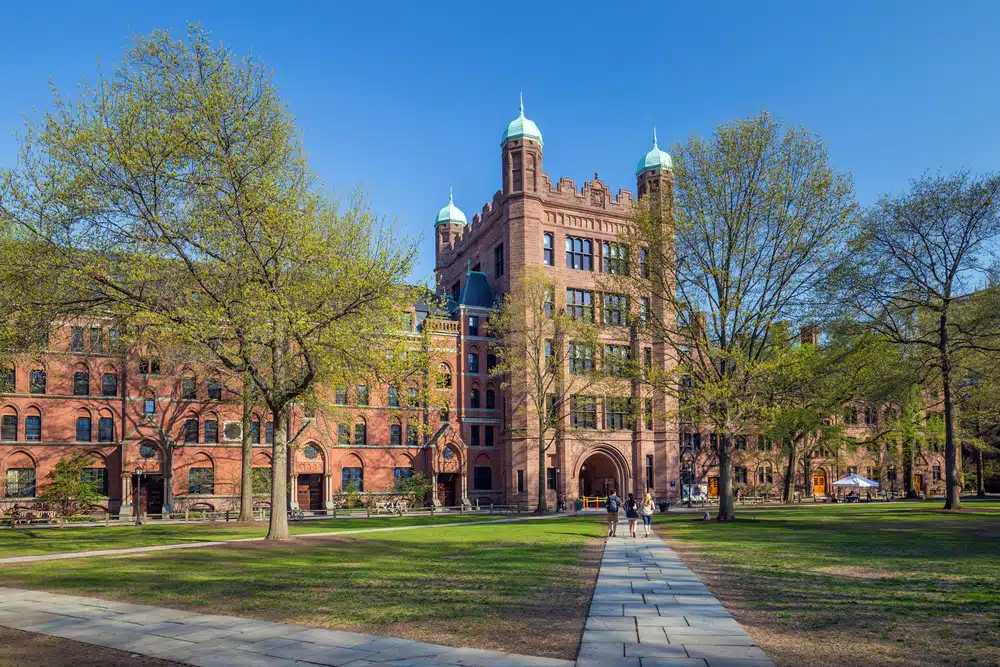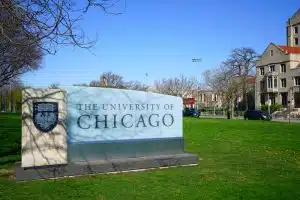What Is Yale Known For?
Yale University, with its long history, is a top academic institution attracting some of the brightest minds not just in the country but from all around the world. This Ivy League school offers competitive degrees and provides an educational experience that shapes future industry leaders. However, what is Yale known for beyond its prestige and intense admission process?
Yale University Fast Facts
- Location: New Haven, CT
- Student Population: 6590 undergraduates
- Acceptance Rate: 4.5%
What is Yale known for?
Yale University is known worldwide as a prestigious higher education institution. Known for its Ivy League status and exceptional music and drama programs, Yale is more than its reputation. It’s a place where students live and learn for four or more years.
Located in New Haven, Connecticut, it is one of the oldest Ivy League schools in the U.S. Known for its academic excellence and rich intellectual environment, Yale has a strong tradition of producing leaders in various fields.

Moreover, here is a list of other things that Yale is known for:
- Top-notch Academic Excellence
- Historic Campus and Tradition
- Industry Research and Innovation
- World-Class Law School and School of Drama
- Yale-NUS College Collaboration
Top Notch Academic Excellence
Yale University is globally recognized for its academic excellence. Renowned programs such as the Yale School of Medicine, Yale Law School, and Yale School of Drama offer undergraduate, graduate, and professional degrees filled in only by the most brilliant students. For example, Yale’s Directed Studies program provides a comprehensive introduction to the great works of Western civilization. The Science, Technology, and Research Scholars (STARS) Program supports STEM students with exceptional learning opportunities.
Yale’s most popular majors include:
- Social Sciences
- Biological
- Biomedical Sciences
- History
- Engineering
- Mathematics
- Statistics
True to its liberal arts tradition, Yale does not offer minors. For students with academic interests that don’t fit into traditional departments, Yale provides several special departments and majors.
- The Special Divisional Major – allows for interdisciplinary academic study outside standard major programs.
- Multidisciplinary Academic Programs (MAPs) in fields such as Education Studies, Energy Studies, Global Health Studies, and Human Rights Studies.
- Five-year BA/BS and Master’s programs in Music, Public Health, and Forestry & Environmental Studies.
For those interested in international experiences, the Yale Summer Session Programs Abroad allow students to earn Yale credit through courses led by Yale faculty in various subjects.
Yale’s faculty are leaders in their fields and have conducted groundbreaking research cementing their expertise. The Yale Center for Genomic Health pioneers research in personalized medicine. The Yale School of the Environment focuses on sustainability and environmental justice. These contributions advance their respective fields and give you the chance to engage in research alongside experts.
Yale University places a strong emphasis on undergraduate teaching and learning, setting it apart from some other prestigious academic institutions. Every professor, including world-renowned experts like Nobel Prize winner Louise Glück, is required to teach at least one undergraduate class each year. With a student-faculty ratio of 6:1, 71% of Yale’s classes have fewer than 20 students, ensuring personalized attention and a more engaging learning experience.
Historic Campus and Tradition
What is Yale known for? Its historic campus and longstanding tradition. They are a part of its identity and appeal. Founded in 1701, Yale is the third-oldest institution of higher education in the United States. The campus, located in New Haven, Connecticut, is known for its stunning architecture and historic buildings.
One of the most iconic buildings is the Sterling Memorial Library, completed in 1930 and named after John W. Sterling, a Yale alumnus and benefactor. The library houses over 4 million volumes and is the heart of Yale’s academic life. Another notable building is the Old Campus, which includes Connecticut Hall, the oldest building on campus, dating back to 1752. The Old Campus serves as the residence for first-year students.

Yale’s traditions include:
- Class Day: This commencement tradition, dating back to the 1800s, features a speech from a student-selected notable figure, awards, and reflections on the graduating class’s four years at Yale through speeches and a film. Students also partake in traditions like the Class Ivy and the singing of “Bright College Years.”
- Holiday Dinner: On the last day of fall semester classes, all undergraduates attend a celebratory dinner. Freshmen enjoy the Parade of Comestibles, an extravagant feast delivered by parade with a live serenade. Upperclassmen dine in their respective residential colleges.
- YSO Halloween Concert: At midnight on Halloween, the Yale Symphony Orchestra performs a student-arranged concert of classical, pop, and film music in Woolsey Hall, accompanied by a silent film created by YSO students. Tickets sell out within minutes of becoming available each year.
- The Game: The annual Yale-Harvard football game, known as “The Game,” attracts students and alumni from both schools. Leading up to the game, there is a festive spirit with various social activities and events.
- First Year Dance: Held every January, the entire first-year class participates in this dance. Suitemates set each other up with dates, whose identities are revealed through creative schemes, such as matching puzzle pieces.
- Spring Fling: A daylong celebration with music and food on Old Campus the day after spring-term classes end. Famous musical artists and student bands perform throughout the day.
- Handsome Dan: In 1889, Yale student Andrew B. Graves bought a bulldog from a blacksmith for $5. Named Handsome Dan, the bulldog became Yale’s mascot, making Yale the first U.S. university to adopt an official mascot. Since then, 19 bulldogs have served as Handsome Dan.
Additionally, Yale has a unique residential college system, established in the 1930s and inspired by the colleges of Oxford and Cambridge. There are 14 residential colleges, each with its own dining hall, library, and student activities, fostering a close-knit community within the larger university. Some of the original colleges include Jonathan Edwards College and Branford College.
Yale also upholds the tradition of academic excellence and intellectual curiosity. The Beinecke Rare Book & Manuscript Library, opened in 1963, is one of the world’s largest buildings dedicated solely to rare books and manuscripts. It houses collections that include a Gutenberg Bible and original manuscripts by authors such as James Joyce and Langston Hughes.
Industry-Leading Research and Innovation
What is Yale known for globally? Yale University is renowned for its industry-leading research and innovation across various fields.
In the sciences, Yale’s medical school has made significant contributions, such as the development of the first cancer chemotherapy treatment in the 1940s by Dr. Alfred Gilman and Dr. Louis Goodman. More recently, Dr. Arthur Horwich’s work on protein folding earned him the Lasker Award in 2011.
Yale’s School of Engineering & Applied Science is another hub of innovation. In 2015, Yale researchers developed CRISPR-Cas9 technology to edit the genome of living organisms, a breakthrough in genetic engineering.
The university also excels in the humanities. Yale scholars, such as Harold Bloom, have made substantial contributions to literary criticism. The Beinecke Rare Book & Manuscript Library houses rare books and manuscripts that support groundbreaking research in history and literature.
What is Yale known for in social sciences? Yale’s economics department is popular and has produced influential research. James Tobin, a Nobel Prize-winning economist, developed the Tobin Tax, a proposal for taxing currency transactions to stabilize financial markets.
Yale’s commitment to interdisciplinary research is evident in initiatives like the Yale Climate & Energy Institute, established in 2009 to address global climate challenges by combining expertise from multiple disciplines.
Overall, Yale’s research and innovation continue to shape various industries and contribute to global advancements.
World-Class Law School and School of Drama
Yale Law School
What is Yale known for? Definitely for its law school! Yale Law School, established in 1824, is one of the top law schools in the world. It has produced numerous influential legal minds, including former U.S. Presidents Gerald Ford and Bill Clinton, as well as Supreme Court Justices Clarence Thomas, Samuel Alito, and Sonia Sotomayor.
What is Yale known for in the field of law? The Law School is known for its small class sizes, with a student-faculty ratio of 4.4:1, allowing for close interactions between students and faculty. Yale Law offers unique programs like the Yale Law Journal, one of the most cited legal publications, and the Jerome N. Frank Legal Services Organization, where students provide legal assistance to those in need.
Yale Law’s faculty includes notable scholars like Akhil Reed Amar, an expert in constitutional law, and Harold Hongju Koh, a former Legal Adviser to the U.S. Department of State. Their contributions have shaped contemporary legal thought and policy.
Yale School of Drama
Yale School of Drama, founded in 1924, is one of the premier drama schools globally. It has trained numerous actors, directors, and playwrights who have made significant impacts on theater, film, and television. Alumni include Meryl Streep, Paul Newman, and Lupita Nyong’o.
The School of Drama offers rigorous programs in acting, directing, playwriting, and design. Students gain practical experience through the Yale Repertory Theatre, established in 1966, which has premiered works by renowned playwrights like August Wilson and Athol Fugard.
Faculty at the School of Drama are distinguished professionals, including James Bundy, the Dean and Artistic Director of the Yale Repertory Theatre, and Tony Award-winning director Ming Cho Lee. Their expertise and guidance help students excel in their craft and prepare for successful careers in the performing arts.
These schools exemplify Yale’s commitment to excellence, providing top-tier education and training that influence law and drama worldwide.
Yale-NUS College Collaboration
What is Yale known for? Its Yale-NUS College partnership. It is a collaboration between Yale University and the National University of Singapore (NUS), was established in 2011. This liberal arts college aims to integrate Western and Eastern academic traditions, providing a unique educational experience in Asia.
The collaboration brought together faculty from both Yale and NUS to create an innovative curriculum. The college offers a broad-based education with interdisciplinary majors, such as Environmental Studies and Urban Studies, designed to equip students with critical thinking and problem-solving skills.
The first class matriculated in 2013, and the college has since grown to accommodate around 1,000 students. Yale-NUS emphasizes a residential college system similar to Yale’s, fostering a close-knit community. The three residential colleges—Saga, Elm, and Cendana—provide a supportive environment for students to live and learn together.
Key figures in the collaboration include Pericles Lewis, the founding President of Yale-NUS College, and Tan Chorh Chuan, the then-President of NUS, who both played significant roles in establishing the partnership. The college has attracted renowned faculty members, including Bryan Penprase, an expert in astronomy, and Jane M. Jacobs, a noted geographer.
Yale-NUS students have access to numerous resources from both parent universities, including study abroad programs, research opportunities, and internships. The college has also developed its own initiatives, such as the Centre for International & Professional Experience (CIPE), which supports students in gaining global exposure and professional development.
The collaboration has produced graduates who are well-prepared for diverse careers and further studies, contributing to fields such as academia, public service, and the private sector. Yale-NUS College continues to stand out as a pioneering model of liberal arts education in Asia.
Frequently Asked Questions
What makes Yale different from other Ivy Leagues?
Yale distinguishes itself from other Ivy League schools through its strong emphasis on undergraduate education and its unique residential college system. Every professor, including world-renowned experts, is required to teach undergraduate courses, ensuring that students receive direct instruction from leading scholars. The 6:1 student-faculty ratio and small class sizes foster personalized learning and close interactions with faculty.
What is Yale known for that sets it apart from other Ivy League schools? Yale’s residential college system creates a supportive and close-knit community. Each of the 14 residential colleges offers its own dining hall, library, and student activities, providing a smaller community within the larger university. This system helps students build strong connections and a sense of belonging, enhancing their overall college experience.
What sport is Yale known for?
Yale is best known for its rowing program. The Yale Bulldogs men’s and women’s rowing teams have a long history of success, with the men’s team dating back to 1843. Yale’s rowing program has produced numerous Olympians and national champions.
The Yale-Harvard Regatta is one of the most famous events in collegiate rowing. Established in 1852, it is the oldest intercollegiate sporting event in the United States. This annual race on the Thames River in New London, Connecticut, draws significant attention and showcases the long-standing rivalry between the two Ivy League schools.
Yale’s rowing facilities, including the Gilder Boathouse, provide top-tier training environments for the athletes. The program’s emphasis on discipline, teamwork, and excellence has made it a standout in collegiate sports, attracting talented rowers from around the world.
What major is Yale known for?
Yale is best known for its political science and economics programs. The Political Science Department has a strong reputation due to its distinguished faculty and comprehensive curriculum. It has produced notable alumni, including U.S. Presidents George H.W. Bush, Bill Clinton, and George W. Bush, as well as numerous other influential political figures.

The Economics Department is also highly regarded, offering rigorous training in economic theory, applied economics, and quantitative methods. Faculty members include prominent economists who have made significant contributions to the field, such as Nobel laureate Robert Shiller. Yale’s economics graduates often pursue successful careers in academia, government, and the private sector.
Both departments emphasize critical thinking, analytical skills, and research, preparing students for a wide range of careers. Yale’s strong focus on interdisciplinary study allows students to combine political science and economics with other fields, enhancing their educational experience and broadening their career opportunities.
Is it expensive to get into Yale?
Yes, attending Yale is expensive, but the university offers substantial financial aid. For the 2023-2024 academic year, the cost of attendance, including tuition, room, board, and fees, is approximately $83,880.
However, Yale meets 100% of demonstrated financial need for all admitted students. About 55% of undergraduates receive financial aid, with the average need-based scholarship being around $60,000 per year. Families earning less than $75,000 annually typically pay nothing for their child’s education.
Yale’s financial aid packages are need-based, not merit-based, ensuring that all admitted students can afford to attend regardless of their financial background. This commitment to affordability makes Yale accessible to a diverse range of students.
Does Yale offer athletic scholarships?
No, Yale does not offer athletic scholarships. As a member of the Ivy League, Yale adheres to the league’s policy of not awarding athletic scholarships. Instead, all financial aid is need-based.
Yale meets 100% of demonstrated financial need for all admitted students, including athletes. This ensures that students who require financial support receive it through grants and scholarships based on their family’s financial situation, not athletic ability.
Athletes at Yale are eligible for the same need-based financial aid as other students. This approach allows student-athletes to focus on both their academic and athletic pursuits without the pressure of maintaining a scholarship based on athletic performance.
What are your odds of getting into Yale University?
Getting into Yale University is highly competitive. For the class of 2027, Yale received 52,250 applications and admitted 2,275 students, resulting in an acceptance rate of about 4.4%. This low acceptance rate reflects Yale’s selective admissions process.
Yale applicants need strong academic credentials. The middle 50% of admitted students typically have SAT scores between 1460 and 1560 or ACT scores between 33 and 35. High school GPA and class rank are also critical factors; most admitted students are in the top 10% of their graduating class.
Beyond academic excellence, Yale looks for students with exceptional extracurricular achievements, leadership qualities, and personal character. Strong letters of recommendation, impactful personal essays, and a demonstrated commitment to extracurricular activities and community service are essential to a successful application.
Yale also values diversity and seeks to admit students from various backgrounds and experiences. This holistic approach means that while academic performance is crucial, other factors like unique talents, perspectives, and life experiences also play a significant role in the admissions process.




































